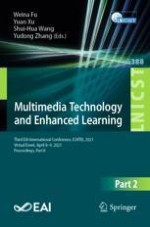2021 | OriginalPaper | Chapter
Towards the Automatic Generation of Pedagogical Conversational Agents from Lecture Slides
Author : Matthias Wölfel
Published in: Multimedia Technology and Enhanced Learning
Publisher: Springer International Publishing
Activate our intelligent search to find suitable subject content or patents.
Select sections of text to find matching patents with Artificial Intelligence. powered by
Select sections of text to find additional relevant content using AI-assisted search. powered by
